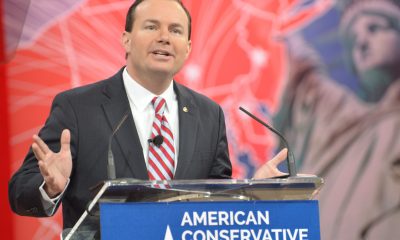National
GOP embraces anti-gay bias in platform
Party calls for federal marriage amendment, vexing Log Cabin

Revelations this week that the Republican Party platform would include strong opposition to same-sex marriage and an endorsement of the Federal Marriage Amendment has renewed debate over whether Log Cabin Republicans should withhold its endorsement of presumptive GOP presidential nominee Mitt Romney because of the anti-gay language.
This week, the 112 members of the Republican Party platform committee approved language that affirms marriage as between one man, one woman; criticizes judges for “court-ordered redefinition of marriage”; attacks the Obama administration for no longer defending the Defense of Marriage Act; and endorses a Federal Marriage Amendment. Buzzfeed revealed the draft language on marriage in a report on Monday and quoted Tony Perkins, president of the Family Research Council, as taking credit for writing the marriage language.
“We reaffirm our support for a constitutional amendment defining marriage as between one man and one woman,” the draft language reportedly states. “We applaud the citizens of the majority of States which have enshrined in their constitutions the traditional concept of marriage, and we support the campaigns underway in several other states to do so.”
During deliberations over the platform, some members of the committee offered amendments to soften the language with respect to marriage — including delegate Barbara Ann Fenton of Rhode Island, who offered language saying the government should get out of marriage and endorse civil unions for gay and straight couples — but each of these measures was defeated by voice vote. Log Cabin Republicans had a four-member delegation credentialed to attend the proceedings.
Now that the platform language has been made public — and assailed by LGBT advocates across the board — calls are emerging for Log Cabin to decline to endorse Romney.
Log Cabin has precedent for declining to endorse presidential candidates in its own party. In 2004, the organization declined to endorse then-President George W. Bush in his bid for re-election largely over his support for a Federal Marriage Amendment. In an op-ed published Sept. 15, 2004, then-Log Cabin President Patrick Guerriero laid out the case for why his organization didn’t endorse its party’s presidential nominee — and referenced disappointment with the 2004 Republican Party platform.
“Even as we saw the GOP’s future highlighted with fair-minded prime-time convention speakers, we saw the passage of an extremist party platform that opposes any basic protections for gay and lesbian families,” Guerriero wrote at the time. “The incongruity between the party’s platform and its list of prime-time speakers symbolizes a wider battle for the GOP’s heart and soul.”
This year, the organization has yet to endorse the Republican presidential ticket, but is expected to announce its decision along with endorsements for congressional candidates prior to its national dinner, which will take place this year in D.C. at the Hyatt Regency on Sept. 20. Log Cabin didn’t respond to the Washington Blade’s request for comment on whether the platform will factor into the endorsement, but the organization has said before it would weigh many factors into the decision.
The co-founders of the “Mitt Gets Worse” LGBT campaign against Romney — Rick Jacobs, chair of the Courage Campaign, and David Brock, founder of American Bridge 21st Century — issued a joint statement on Wednesday decrying the platform language and calling on Log Cabin not to endorse the candidate.
“Surely, the Log Cabin Republicans, who exist to promote full equality in the Republican Party will now find it impossible to endorse Mitt Romney and Paul Ryan, just as they had to pass on endorsing then-President Bush in 2004 when he and the Republican Party were then actively pushing an anti-marriage equality amendment to the Constitution while promoting anti-marriage equality state referenda,” Brock and Jacobs said. “The Republican Party and its nominees keep getting worse for LGBT Americans.”
The organization last week submitted a petition to Log Cabin — which is still available online — calling on the organization to decline to endorse Romney during the 2012 election based on the candidate’s anti-LGBT record. As of Wednesday, the petition had 35,000 signatures.
But the 2012 platform language is in line with Romney’s beliefs. He backs a U.S. constitutional amendment banning same-sex marriage throughout the country even as he said he doubts Congress would have the political wherewithal to pass it. He also pledged to resume defending the Defense of Marriage Act in court.
Republican vice presidential candidate Paul Ryan is similarly on the record with beliefs that are in accordance with the platform. As a U.S. House member, Ryan voted in favor of the Federal Marriage Amendment in 2004 and 2006. More recently, he voted for amendments to separate bills reaffirming the Defense of Marriage Act.
Gay Republicans had mixed views on whether the platform language should be a factor in the organization’s decision to endorse Romney.
Jim Driscoll, a a gay Nevada-based HIV/AIDS activist who’s backing Romney in the presidential election, has previously called on Log Cabin to endorse Romney and continued to say the organization should do so — with the caveat that the organization should express consternation over the party platform.
“They should endorse him despite the platform, but they should say it in spite of the platform and condemn those elements in the platform that are completely out of touch with the gay community and out of touch with America,” Driscoll said. “It should be an endorsement with that reservation — that they condemn that trend.”
Recalling Bush officially won Florida by a margin of 537 votes, Driscoll said gay Republicans were responsible for putting the candidate over the top. Driscoll said the Romney campaign should handle the issue of gay rights “more carefully, perceptively, sensitively, intelligently,” even though he acknowledged that the presidential campaign wasn’t responsible for writing the platform.
Log Cabin Republicans has responded to the platform. On Wednesday, Cooper issued a statement calling the inclusion of anti-gay language “a hollow and short-lived victory” for social conservatives who “know that public opinion is rapidly turning in favor of equality.” But the question of whether the organization will endorse Romney in spite of the language remains.
Robert Turner, president of the D.C. chapter of Log Cabin Republicans, said the platform language shouldn’t play a role in whether Log Cabin endorses because the platform document is unrelated to the candidate seeking the White House.
“The party platform is a document of the Republican Party not of the candidate,” Turner said.
Turner declined to opine on whether the national organization should endorse Romney, saying the decision is up to the national board.
Federal Government
Lambda Legal praises Biden-Harris administration’s finalized Title IX regulations
New rules to take effect Aug. 1

The Biden-Harris administration’s revised Title IX policy “protects LGBTQ+ students from discrimination and other abuse,” Lambda Legal said in a statement praising the U.S. Department of Education’s issuance of the final rule on Friday.
Slated to take effect on Aug. 1, the new regulations constitute an expansion of the 1972 Title IX civil rights law, which prohibits sex-based discrimination in education programs that receive federal funding.
Pursuant to the U.S. Supreme Court’s ruling in the landmark 2020 Bostock v. Clayton County case, the department’s revised policy clarifies that discrimination on the basis of sexual orientation and gender identity constitutes sex-based discrimination as defined under the law.
“These regulations make it crystal clear that everyone can access schools that are safe, welcoming and that respect their rights,” Education Secretary Miguel Cardona said during a call with reporters on Thursday.
While the new rule does not provide guidance on whether schools must allow transgender students to play on sports teams corresponding with their gender identity to comply with Title IX, the question is addressed in a separate rule proposed by the agency in April.
The administration’s new policy also reverses some Trump-era Title IX rules governing how schools must respond to reports of sexual harassment and sexual assault, which were widely seen as imbalanced in favor of the accused.
Jennifer Klein, the director of the White House Gender Policy Council, said during Thursday’s call that the department sought to strike a balance with respect to these issues, “reaffirming our longstanding commitment to fundamental fairness.”
“We applaud the Biden administration’s action to rescind the legally unsound, cruel, and dangerous sexual harassment and assault rule of the previous administration,” Lambda Legal Nonbinary and Transgender Rights Project Director Sasha Buchert said in the group’s statement on Friday.
“Today’s rule instead appropriately underscores that Title IX’s civil rights protections clearly cover LGBTQ+ students, as well as survivors and pregnant and parenting students across race and gender identity,” she said. “Schools must be places where students can learn and thrive free of harassment, discrimination, and other abuse.”
Michigan
Mich. Democrats spar over LGBTQ-inclusive hate crimes law
Lawmakers disagree on just what kind of statute to pass

Michigan could soon become the latest state to pass an LGBTQ-inclusive hate crime law, but the state’s Democratic lawmakers disagree on just what kind of law they should pass.
Currently, Michigan’s Ethnic Intimidation Act only offers limited protections to victims of crime motivated by their “race, color, religion, gender, or national origin.” Bills proposed by Democratic lawmakers expand the list to include “actual or perceived race, color, religion, gender, sexual orientation, gender identity or expression, ethnicity, physical or mental disability, age, national origin, or association or affiliation with any such individuals.”
Democratic Gov. Gretchen Whitmer and Attorney General Dana Nessel have both advocated for a hate crime law, but house and senate Democrats have each passed different hate crimes packages, and Nessel has blasted both as being too weak.
Under the house proposal that passed last year (House Bill 4474), a first offense would be punishable with a $2,000 fine, up to two years in prison, or both. Penalties double for a second offense, and if a gun or other dangerous weapons is involved, the maximum penalty is six years in prison and a fine of $7,500.
But that proposal stalled when it reached the senate, after far-right news outlets and Fox News reported misinformation that the bill only protected LGBTQ people and would make misgendering a trans person a crime. State Rep. Noah Arbit, the bill’s sponsor, was also made the subject of a recall effort, which ultimately failed.
Arbit submitted a new version of the bill (House Bill 5288) that added sections clarifying that misgendering a person, “intentionally or unintentionally” is not a hate crime, although the latest version (House Bill 5400) of the bill omits this language.
That bill has since stalled in a house committee, in part because the Democrats lost their house majority last November, when two Democratic representatives resigned after being elected mayors. The Democrats regained their house majority last night by winning two special elections.
Meanwhile, the senate passed a different package of hate crime bills sponsored by state Sen. Sylvia Santana (Senate Bill 600) in March that includes much lighter sentences, as well as a clause ensuring that misgendering a person is not a hate crime.
Under the senate bill, if the first offense is only a threat, it would be a misdemeanor punishable by one year in prison and up to $1,000 fine. A subsequent offense or first violent hate crime, including stalking, would be a felony that attracts double the punishment.
Multiple calls and emails from the Washington Blade to both Arbit and Santana requesting comment on the bills for this story went unanswered.
The attorney general’s office sent a statement to the Blade supporting stronger hate crime legislation.
“As a career prosecutor, [Nessel] has seen firsthand how the state’s weak Ethnic Intimidation Act (not updated since the late 1980’s) does not allow for meaningful law enforcement and court intervention before threats become violent and deadly, nor does it consider significant bases for bias. It is our hope that the legislature will pass robust, much-needed updates to this statute,” the statement says.
But Nessel, who has herself been the victim of racially motivated threats, has also blasted all of the bills presented by Democrats as not going far enough.
“Two years is nothing … Why not just give them a parking ticket?” Nessel told Bridge Michigan.
Nessel blames a bizarre alliance far-right and far-left forces that have doomed tougher laws.
“You have this confluence of forces on the far right … this insistence that the First Amendment protects this language, or that the Second Amendment protects the ability to possess firearms under almost any and all circumstances,” Nessel said. “But then you also have the far left that argues basically no one should go to jail or prison for any offense ever.”
The legislature did manage to pass an “institutional desecration” law last year that penalizes hate-motivated vandalism to churches, schools, museums, and community centers, and is LGBTQ-inclusive.
According to data from the U.S. Department of Justice, reported hate crime incidents have been skyrocketing, with attacks motivated by sexual orientation surging by 70 percent from 2020 to 2022, the last year for which data is available.
Twenty-two states, D.C., Puerto Rico, and the U.S. Virgin Islands have passed LGBTQ-inclusive hate crime laws. Another 11 states have hate crime laws that include protections for “sexual orientation” but not “gender identity.”
Michigan Democrats have advanced several key LGBTQ rights priorities since they took unified control of the legislature in 2023. A long-stalled comprehensive anti-discrimination law was passed last year, as did a conversion therapy ban. Last month the legislature updated family law to make surrogacy easier for all couples, including same-sex couples.
A bill to ban the “gay panic” defense has passed the state house and was due for a Senate committee hearing on Wednesday.
Indiana
Drag queen announces run for mayor of Ind. city
Branden Blaettne seeking Fort Wayne’s top office

In a Facebook post Tuesday, a local drag personality announced he was running for the office of mayor once held by the late Fort Wayne Mayor Tom Henry, who died last month just a few months into his fifth term.
Henry was recently diagnosed with late-stage stomach cancer and experienced an emergency that landed him in hospice care. He died shortly after.
WPTA, a local television station, reported that Fort Wayne resident Branden Blaettne, whose drag name is Della Licious, confirmed he filed paperwork to be one of the candidates seeking to finish out the fifth term of the late mayor.
Blaettner, who is a community organizer, told WPTA he doesn’t want to “get Fort Wayne back on track,” but rather keep the momentum started by Henry going while giving a platform to the disenfranchised groups in the community. Blaettner said he doesn’t think his local fame as a drag queen will hold him back.
“It’s easy to have a platform when you wear platform heels,” Blaettner told WPTA. “The status quo has left a lot of people out in the cold — both figuratively and literally,” Blaettner added.

The Indiana Capital Chronicle reported that state Rep. Phil GiaQuinta, who has led the Indiana House Democratic caucus since 2018, has added his name to a growing list of Fort Wayne politicos who want to be the city’s next mayor. A caucus of precinct committee persons will choose the new mayor.
According to the Fort Wayne Journal Gazette, the deadline for residents to file candidacy was 10:30 a.m. on Wednesday. A town hall with the candidates is scheduled for 6 p.m. on Thursday at Franklin School Park. The caucus is set for 10:30 a.m. on April 20 at the Lincoln Financial Event Center at Parkview Field.
At least six candidates so far have announced they will run in the caucus. They include Branden Blaettne, GiaQuinta, City Councilwoman Michelle Chambers, City Councilwoman Sharon Tucker, former city- and county-council candidate Palermo Galindo, and 2023 Democratic primary mayoral candidate Jorge Fernandez.
-

 Africa4 days ago
Africa4 days agoCongolese lawmaker introduces anti-homosexuality bill
-

 District of Columbia1 day ago
District of Columbia1 day agoReenactment of first gay rights picket at White House draws interest of tourists
-

 World5 days ago
World5 days agoOut in the World: LGBTQ news from Europe and Asia
-

 Arizona1 day ago
Arizona1 day agoAriz. governor vetoes anti-transgender, Ten Commandments bill










